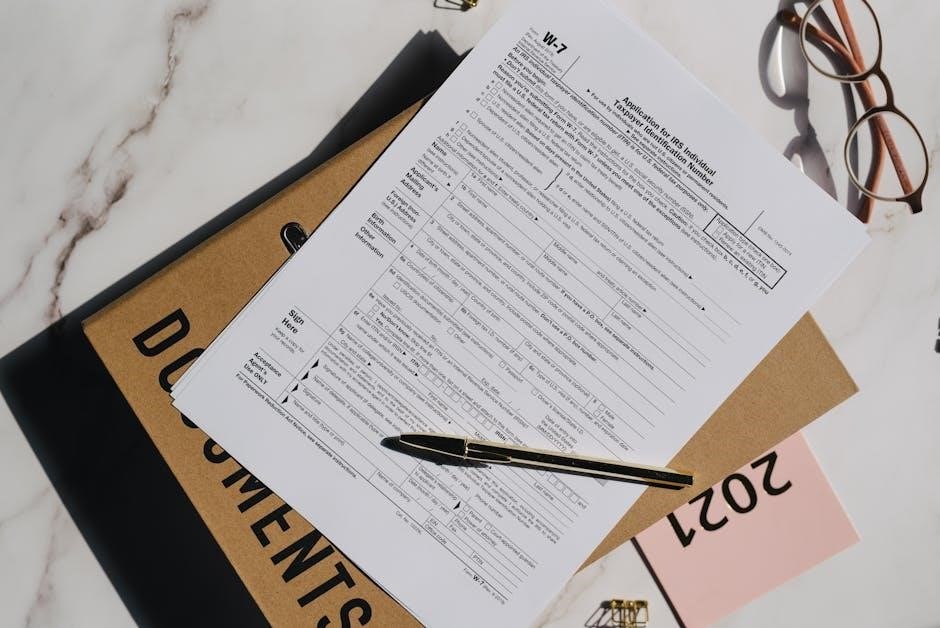
The sixth form application process is a straightforward procedure that requires submitting a completed form with personal details, academic information, and supporting documents like birth certificates and recent photographs. Deadlines are crucial, ensuring timely submission for consideration. This process is essential for students transitioning to post-16 education, offering a structured pathway to further academic growth and opportunities.
Overview of Sixth Form Education
Sixth form education is a two-year program for students aged 16-18, focusing on advanced studies like A-levels, BTECs, or vocational courses. It prepares students for university, careers, or further education, fostering independence and academic excellence; Sixth form colleges and schools offer diverse subject options, extracurricular activities, and support systems to help students achieve their goals. This phase is crucial for developing skills, building confidence, and laying the foundation for future success in various fields. It also provides opportunities for personal growth and exploration of interests.
Why Apply to Sixth Form?
Applying to sixth form offers students the opportunity to further their academic and personal development. It provides access to specialized courses, such as A-levels and BTECs, which are essential for university entry and career paths. Sixth form education fosters independence, critical thinking, and leadership skills. Additionally, it offers a supportive environment to explore interests and prepare for future challenges. This phase is a stepping stone to higher education and professional success, making it a vital choice for students aiming to achieve their long-term goals.

Key Sections of the Sixth Form Application Form
The sixth form application form includes key sections such as personal details, academic information, subject choices, supporting documents, and parent/guardian information.
Personal Details
The personal details section requires applicants to provide essential information such as their full name, date of birth, contact details, and nationality. This section ensures the institution can communicate effectively and maintain accurate records. Applicants must also include their current address and, if applicable, details of their parent or guardian. Some forms may additionally request information about the applicant’s previous schools or student status. Ensuring accuracy in this section is crucial, as errors may delay processing. Double-checking the information before submission is highly recommended to avoid discrepancies. Proper completion of this section is the first step toward a successful application.
Academic Information
The academic information section requires applicants to provide details about their educational background, including previous schools attended, qualifications achieved, and exam results. This section typically asks for GCSE grades, BTEC results, or equivalent qualifications. Applicants must list all relevant subjects studied and the grades obtained. Additionally, some forms may request information about mock exam results or predicted grades. This section is crucial for assessing a student’s academic suitability for sixth form courses. Ensuring accuracy and completeness is essential, as this information helps schools evaluate eligibility for specific subjects. Proper documentation and verification may be required.
Subject Choices
The subject choices section allows applicants to list the A-level or BTEC subjects they wish to study in sixth form. Students must select subjects that align with their academic strengths and career aspirations. Applicants should ensure their choices meet the entry requirements for each subject, which may include specific GCSE grades. Listing up to three or four subjects is common, depending on the institution. This section helps schools assess a student’s suitability for their chosen pathway and plan course availability. It is crucial to make informed choices to set a strong foundation for future studies. Proper alignment with academic goals is key.
Supporting Documents
Applicants must submit specific documents to complete their sixth form application. These typically include a copy of their birth certificate, a valid passport, and recent academic reports. Additionally, a passport-sized photograph is often required. Some institutions may request proof of residency or other relevant documentation. Ensuring all supporting documents are accurate and submitted on time is crucial for processing the application. Incomplete submissions may delay consideration. These documents help verify eligibility and provide insight into the applicant’s background and qualifications for sixth form study.
Parent/Guardian Information
The application form requires detailed contact information for a parent or guardian, including their full name, email address, and phone number. This ensures communication regarding the applicant’s progress and admission status. Additionally, some forms may ask for emergency contact details to maintain student safety. Parents/guardians are often required to sign the form, confirming their consent and verification of the information provided. This section is crucial for maintaining a clear line of communication between the institution and the applicant’s family.
Accurate and up-to-date information is essential to ensure proper record-keeping and timely updates. Parents/guardians play a significant role in supporting students throughout their sixth form journey, making this section vital for building a collaborative relationship with the school. Delays in providing this information may hinder the application process, so it is important to complete this section thoroughly and promptly.

Required Documents for Submission
The application requires submitting a birth certificate, passport copy, recent photograph, academic reports, and supporting documents like references or proof of residency, as specified.
Academic Reports
Academic reports are essential documents that provide detailed information about a student’s performance, including grades, progress, and teacher comments. These reports are typically required to assess eligibility for sixth form admission. Applicants must submit their most recent academic reports, usually from the last academic year, to demonstrate their academic capabilities. Some institutions may also request mid-term reports if applying before final exams. Ensuring these documents are up-to-date and accurately reflect a student’s academic standing is crucial for a successful application. Proper submission of these reports is a key step in the process.
Passport Copy
A valid passport copy is a mandatory document for sixth form applications, ensuring verification of identity and eligibility. Applicants must provide a clear, legible copy of their passport’s bio page. This document is crucial for both UK and international students, as it confirms nationality and residency status. It is essential to ensure the passport is not expired and that the copy meets the institution’s specifications. Submitting a valid passport copy helps streamline the application process and prevents delays in processing. This document is a key requirement for all applicants, regardless of their background or nationality.
Birth Certificate
A birth certificate is a required document for sixth form applications, verifying the applicant’s age, nationality, and residency status. It must be a certified copy, either original or a notarized version, and submitted in English. If the document is in another language, an official translation is necessary. This ensures eligibility and compliance with admission criteria. The birth certificate is a standard requirement for all applicants, including both UK and international students, and must be uploaded or mailed along with the application form to complete the submission process successfully.
Recent Photograph
A recent passport-sized photograph is typically required as part of the sixth form application process. The image should be clear, in color, and taken within the last six months to ensure it accurately represents the applicant’s current appearance. This photograph is used for identification purposes and may be included in school records or student ID cards. It should be submitted digitally or as a physical copy, depending on the institution’s requirements, and must meet specified size and quality standards to ensure clarity and professionalism.

Eligibility Criteria for Sixth Form
Eligibility for sixth form typically includes meeting academic requirements, such as GCSE grades, being within the specified age range, and fulfilling residency or visa requirements.
Academic Requirements
The academic requirements for sixth form typically include achieving specific grades in GCSE or equivalent qualifications. Many institutions require a minimum of five GCSE passes at Grade 4 or above, with particular emphasis on English and Mathematics. Some subjects may demand higher grades, such as Grade 5 or 6, depending on the course. Additionally, applicants must meet subject-specific entry requirements, ensuring they have the necessary foundation for advanced studies. A strong academic record is essential for a successful application.
Age Requirements
The age requirements for sixth form applicants typically range between 16 to 19 years old. Most institutions require students to be at least 16 years old by the start of the academic year. Some schools may have specific age-related policies, and exceptions can be made for students with special circumstances. Meeting the age criteria is essential to ensure eligibility for the sixth form program. This requirement aligns with the typical post-16 education framework, preparing students for further academic and professional opportunities.
Residency Requirements
Residency requirements vary by institution, but typically, applicants must demonstrate they are legally residing in the country or region where the sixth form is located. Proof of residency, such as a passport or utility bills, may be requested. International students may need to provide additional documentation, like a valid visa. Meeting residency criteria ensures eligibility for local funding or placement; Some schools may have specific policies for overseas applicants. Residency status can affect tuition fees and application processing. Ensuring compliance with these requirements is crucial for a smooth application process.

Submission Process and Deadlines
Submit your application online by the specified deadline, ensuring all required documents are uploaded. Track your application status through the provided portal or via email notifications.
Online Application Process
Complete the application form on a computer, ensuring pop-ups are enabled. Fill in personal details, academic information, and upload required documents like birth certificates and recent photographs. Review all sections carefully before submission. Once submitted, track your application status through the provided portal or via email notifications. Ensure timely completion to meet deadlines and avoid delays in processing.
Submission Deadlines
Submission deadlines for sixth form applications vary by institution but often fall between January and March. For example, Manchester High School for Girls sets its deadline for Friday, February 10. Cadbury Sixth Form College also specifies deadlines for September intake. Missing these deadlines can delay processing or result in lost opportunities. Ensure timely submission by reviewing and finalizing your application well in advance. Check individual school websites for specific dates, as they may differ. Late submissions are typically not accepted, so adherence to deadlines is crucial for a smooth application process.
Tracking Application Status
After submitting your sixth form application, you can typically track its status through the school’s online portal or by contacting the admissions office. Many institutions provide confirmation emails with details on how to monitor your application progress. Ensure you retain any login credentials or reference numbers provided. Applicants are encouraged to follow up if they haven’t received updates within a reasonable timeframe. Regularly checking your email and the school’s website can help you stay informed about the progress of your application.

Tips for a Successful Application
Tips for a successful sixth form application include completing the form accurately, submitting it on time, and ensuring all required documents are included.
Completing the Form Accurately
Completing the sixth form application form accurately is crucial to avoid delays or rejection. Ensure all personal and academic details are correct, and thoroughly proofread for errors. Provide clear and concise information, especially in the supporting statement, to highlight your strengths and reasons for applying. Double-check that all required fields are filled and that the form is fully completed before submission. Using a computer rather than a mobile device can help ensure accuracy and ease of use.
Writing a Strong Supporting Statement
A well-crafted supporting statement is essential for a successful sixth form application. It should highlight your academic strengths, career aspirations, and reasons for choosing the sixth form. Be specific about your achievements and how they align with your future goals. Avoid generic statements and ensure your passion for the chosen subjects shines through. Keep your writing clear, concise, and focused, demonstrating your commitment and enthusiasm for further education. This statement is your opportunity to stand out, so make it compelling and authentic.
Ensuring Timely Submission
Submit your sixth form application well before the deadline to avoid last-minute issues. Review all requirements and deadlines carefully, as late submissions may not be accepted. Ensure your form is complete, with all supporting documents attached. Use a computer for better navigation and enable pop-ups to avoid technical difficulties. Double-check the submission confirmation to confirm your application has been received. Timely submission demonstrates responsibility and increases your chances of securing a place. Plan ahead to avoid delays and ensure a smooth application process.

What to Expect After Submission
After submitting your sixth form application, expect confirmation of receipt and potential interview invitations. Successful applicants receive offer letters outlining next steps, including induction details.
Interview Process
The interview process for sixth form applications typically involves a discussion with academic staff to assess suitability for chosen courses. Candidates may be asked about their academic strengths, career aspirations, and reasons for selecting the sixth form. Preparation is key, as applicants should research the institution and practice responses to common questions. Some schools may also review recent academic reports or request additional information during the interview. This step is crucial for evaluating a student’s potential and fit within the sixth form community.
Offer Letters
Upon successful review of the application, offer letters are sent to candidates, outlining the courses offered and expected start dates. These letters may include specific conditions, such as achieving certain grades in exams. Applicants must review and respond to secure their place, often by a specified deadline. The letter serves as formal confirmation of admission and provides details for enrollment. It’s important to carefully read and adhere to the terms to ensure a smooth transition into the sixth form program.
Induction Process
The induction process is a crucial step after receiving an offer letter, designed to familiarize students with the sixth form environment. It typically includes orientation events, introductions to key staff, and tours of facilities. Students also engage in icebreaker activities to meet peers. The process outlines expectations, academic policies, and support services. This transition period helps students adapt smoothly to the new academic and social setting, ensuring they feel prepared and confident as they begin their sixth form journey.

Choosing the Right Sixth Form
Choosing the right sixth form involves considering location, facilities, and course offerings. Research schools, visit open days, and evaluate their reputation and support services to find the best fit for your academic and personal goals, ensuring a smooth transition to post-16 education.
Researching Schools
Researching schools is a crucial step in the sixth form application process. Prospective students should explore each school’s website, course offerings, and extracurricular opportunities. Attend open days to gauge the school’s atmosphere and facilities. Review academic performance, teaching quality, and support services. Consider factors like location, class sizes, and access to resources. Understanding each school’s unique strengths helps applicants align their goals with the right institution, ensuring a well-informed decision for their post-16 education.
Considering Location and Facilities
When applying to sixth form, evaluating the location and facilities of schools is essential. Consider proximity to home, public transport links, and safety. Facilities such as libraries, laboratories, sports centers, and theaters can enhance learning and extracurricular experiences. Ensure the school offers resources aligned with your interests and academic goals. A convenient location can simplify daily routines, while modern facilities can provide a supportive environment for personal and academic growth, contributing to a positive sixth form experience.
Evaluating Course Offerings
Evaluating the range of courses offered by sixth form providers is crucial for aligning with your academic and career goals. Consider subjects like STEM, arts, and humanities, ensuring they match your interests and future aspirations. Look for schools offering diverse A-level or BTEC options, as well as extracurricular programs. Ensure the institution provides necessary resources and support for your chosen subjects. This step ensures you select a sixth form that offers the right academic pathway to prepare you for university or professional opportunities, enhancing your overall educational experience.

Common Mistakes to Avoid
Ensure all sections are filled completely, avoid missing deadlines, and double-check for errors. Misrepresentation of information can lead to rejection, so accuracy is crucial throughout the process.
Incomplete Applications
Incomplete applications are a common issue, often due to missing documents like academic reports, passport copies, or photographs. Ensure all sections are filled and required files are uploaded. Double-check for errors and completeness before submission. Starting the application on a computer and enabling pop-ups can help avoid technical issues. Missing information may delay processing or lead to rejection. Always review the application thoroughly to ensure no fields or documents are overlooked, as this is crucial for a smooth and successful submission process.
Misrepresentation of Information
Misrepresentation of information can lead to serious consequences, including rejection or withdrawal of offers. Applicants must ensure all details, such as academic grades and personal statements, are accurate. False information about GCSE results or previous schools can jeopardize the application. It is essential to provide truthful data to maintain integrity and avoid future complications. Always verify the accuracy of the information before submission to uphold the trust and credibility of the application process.
Missing Deadlines
Missing deadlines can result in applications being rejected or delayed, impacting opportunities for Sixth Form placement. Late submissions are often not considered, as schools allocate spaces based on timely applications. To avoid this, applicants should create a checklist and set reminders for key dates. Submitting early ensures time to address any issues. Missing deadlines can lead to disappointment, so careful planning and organization are crucial to meet the required timelines and secure a place in the Sixth Form program of choice.

Special Considerations
Special considerations may apply for international students, those with special needs, or transfer students. Additional documentation or support may be required to accommodate specific circumstances during the application process.
International Students
International students applying to sixth form must provide additional documentation, such as a passport copy and birth certificate in English. They may also need to demonstrate English proficiency and meet specific visa requirements. Some schools offer support for international applicants, including language assistance and cultural integration programs. It’s essential to check if the institution requires certified translations of academic records or other supporting documents. Deadlines for international applications may differ, so early submission is recommended to allow time for processing.
Students with Special Needs
Students with special needs should declare their requirements early in the application process to ensure appropriate support is arranged. Schools often provide additional resources, such as learning assistants or modified facilities, to accommodate these students. Applicants may need to submit specific documentation, like an Education, Health and Care (EHC) plan or medical reports, to assist the sixth form in meeting their needs effectively. Many institutions are committed to inclusivity and will work closely with applicants to create a supportive environment for their academic success.
Transfer Students
Transfer students must provide detailed academic records from their previous institution to support their application. They may also be required to meet with sixth form advisors to discuss their academic history and goals. Additional documentation, such as letters of recommendation or progress reports, may be requested to assess eligibility. Some schools may conduct interviews with transfer applicants to evaluate their suitability for the program. Ensuring a smooth transition is a priority, and schools often offer guidance to help transfer students integrate successfully into their new environment.
Completing the sixth form application form is a crucial step toward advancing your education. Ensure all details are accurate and documents are submitted on time. This process paves the way for future opportunities, helping you achieve your academic and career goals. Take it seriously and make the most of this chance to grow and succeed.
Final Checklist for Applicants
Ensure all sections of the application form are fully completed and accurate. Verify personal details, academic information, and subject choices. Attach required documents like birth certificates, passports, and recent photographs. Double-check the supporting statement, highlighting your strengths and reasons for applying. Review the form for any errors or omissions. Confirm the application is submitted by the deadline. Use a computer for better usability and ensure pop-ups are enabled. Keep a copy of the submitted form for your records. A well-prepared application increases your chances of a successful outcome.
The Importance of Sixth Form Education
Sixth form education is crucial for students seeking advanced qualifications and personal growth. It offers specialized study in chosen subjects, preparing students for university and careers. Beyond academics, it fosters critical thinking and independence, essential for future success. The mature environment readies students for higher education’s challenges. Sixth form plays a key role in shaping well-rounded individuals who contribute positively to society, helping them identify strengths and interests for future pathways while offering diverse course options.




